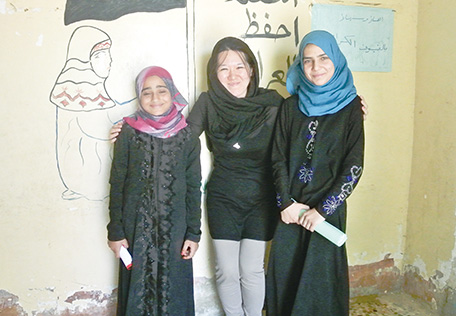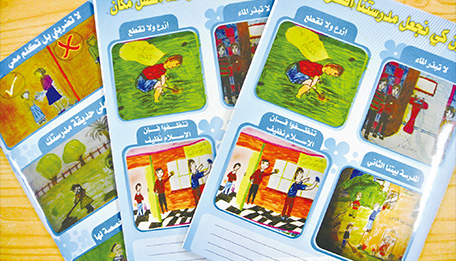Japan's Official Development Assistance White Paper 2013
Stories from the field 11
Encouraging Elementary School Students to Improve Their Schools through Classroom Cleaning and Children’s Clubs
– The Activities of Save the Children Japan in Iraq –

Ms. Nishimoto with girls who are promoting the importance of participating in school improvement activities at Children’s Clubs. (Photo: Save the Children)
War-torn Iraq continues to face the problem of having an insufficient children’s educational infrastructure, being unable to secure a sufficient budget for education due to the impact of the many years of conflict, as of yet unstable security situation, and financial difficulties. In 2010, the international NGO Save the Children Japan took advantage of Grant Assistance for Japanese NGO Projects from the Ministry of Foreign Affairs (MOFA), and is now developing the “Community Participatory School Rehabilitation and Management Program” in the southern Iraqi governorate of Basrah.
A big problem in the region is the lack of school buildings. It is now often the case that one school building is used for two to three schools. In the case of two schools sharing the same building, a division is made between the morning and afternoon, with each school receiving its own time period to conduct classes. Classes typically have around 50 children. There are also children studying in temporary tents due to the lack of classrooms. Although Iraq’s school buildings continue to age and many school facilities have been destroyed, repairs go undone due to insufficient budgets.
This project collaborates with the Education Directorate of Basrah to support the establishment of School Management Committees in 40 schools sharing 22 facilities within the governorate. The committees comprise stakeholders such as school principals, teachers, guardians, and local residents. They work to identify problems in the school environment and carry out maintenance. They make flower beds in school yards and carry out repairs of school facilities, and in doing so, they promote interschool cooperation which has been weak for the facilities they share and begin the joint implementation of events and joint management of school supplies and other materials.
Ms. Atsuko Nishimoto is the program manager working in Iraq on this project for Save the Children Japan. She spoke about the significance of this project.
“Iraq doesn’t have the custom of having teachers and guardians meet voluntarily to discuss school management and work for it. But in order to make efficient use of the limited facilities and improve the educational environment for the children, we must get all of the stakeholders involved in management. We identify issues, make improvement plans, implement them, and verify results. And through this process, it becomes possible for the stakeholders to share their understanding of the problems faced by the school and feel the effects of facility repairs if they are carried out.”
Another significant aspect of this project is the promotion of participation by children, which is the right of every child. Children must not be treated as mere beneficiaries of school environment improving process, but as partners. Children’s Clubs have been established at 40 target schools. These clubs have created a framework for children to get involved in improving their own learning environment through activities such as the presentation of their own opinions and communication of messages to the adults and other children. Through these Children’s Clubs, children are making flower beds, performing plays, reading, and making posters.
“It isn’t the case that the primary enrollment rate in Iraq is extremely low – it’s actually around 85%. Even so, depending on the region, there are many more children who cannot attend school because household finances are tight or because the child is a girl. I have been very happy to hear about children who dropped out of school now coming to participate in the Children’s Clubs through the various opportunities, realizing that school is fun, and then once again starting to attend school.”
There has also been a cleaning campaign in which children, teachers, School Management Committee members and local residents are gathered to clean schools. In order to manage their own facilities, children need to feel attachment towards their schools and treat them with care. However, in Iraq, like many countries around the world, it is unusual for children to clean their own classrooms.
“At the backdrop of the effort to implement the Japanese custom of school cleaning in Iraq is the trust that the Iraqis feel towards Japan since before the war. I feel strongly that many Iraqis have the desire to learn from Japan as a country that recovered from the ravages of World War II to become one of the world’s economic superpowers.”
This year (2013) marks ten years since the start of the Iraq war. The country is now in a period of transition from post-war reconstruction to the rebuilding of independence, and the fostering of human resources through education is indispensable to the reconstruction of Iraq and its development. Ms. Nishimoto has only limited opportunities to visit the project sites due to security concerns, but she is working to implement effective support.
“One effect of this project has been the implementation of training for teachers by the officials of the education directorates on their own. Foreign aid programs will eventually end. I hope that the people of the Basrah governorate will continue forward with what they have gained through this project and work to spread their activities to many more children within this governorate and serve as a model for others.”

Notebooks made by Children’s Clubs to promote school improvement. They even include messages like “Let’s keep our school clean! The teachings of Islam also ask this of us.” (Photo: Save the Children)
